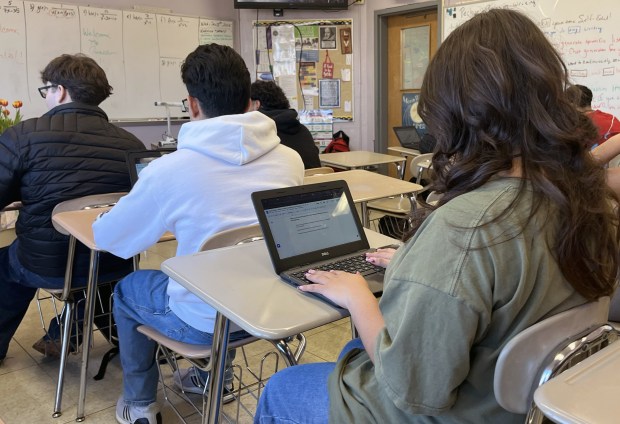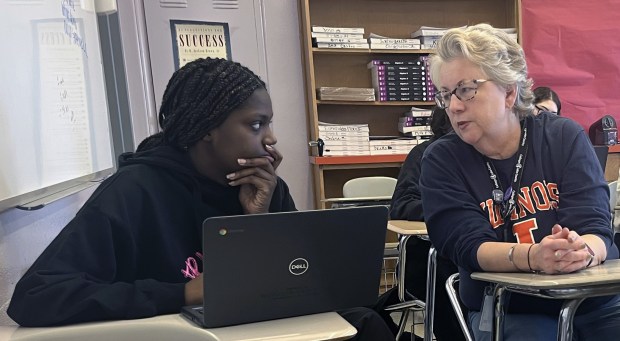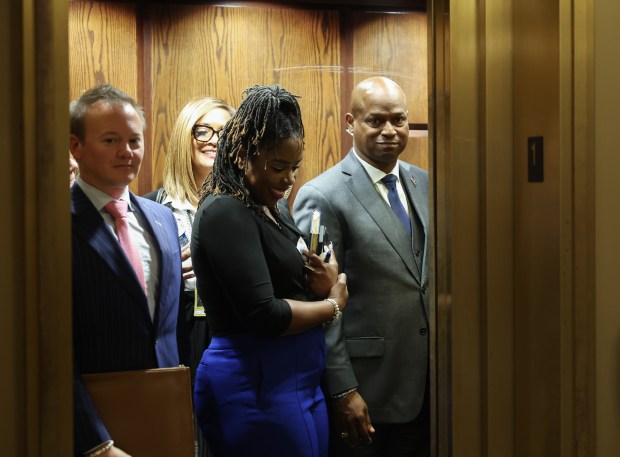Shortly after November’s presidential election, Heloise Pechan noticed a mood change in students taking her dual-credit English class at Waukegan High School, which gives them a credit toward graduation which they can also apply toward a degree from the college of their choice.
Normally lively, talkative and eager to participate in class discussions, Pechan said that was no longer the case after Donald Trump became president-elect. The mood swing became more intense after he took office and started signing numerous executive orders.
“They were always joyful, bubbly and friendly,” she said. “After the election, their faces and their demeanor were different. They got very quiet. They know the people in our community very well. People are afraid when they get home their parents may not be there.”
While Waukegan Community Unit School District 60 was reinforcing its safe-haven status, educating families about their rights and how to handle a knock on the door from a U.S. Immigration Customs Enforcement (ICE) agent, Pechan helped her students with an assignment.
Pechan, a teacher at both the high school and the College of Lake County, asked her English composition students to write a one-paragraph letter to Trump after his Jan. 20 inauguration in Washington expressing their feelings about an issue impacting them.
“May we follow through on our convictions of educating, nurturing, loving, preparing, protecting the youth of Waukegan, especially when an adult, in an incredible position of power chooses to frighten and demean perceived weaker people,” she said.
Of the 20 students completing the assignment, 10 chose to share their work with the News-Sun. Three asked that their names be withheld for fear of retribution or deportation. Six wrote on immigration-related issues, two on the environment, one on voting rights and another on capital punishment.
Viviana Flores-Rios remembers feeling fear when Trump first became president eight years ago. Her fear has grown, especially for friends with undocumented parents. Losing parents who came to America to give their children a better life should never happen, she wrote.
“I know many people in my community are without papers and my heart hurts for them,” Flores-Rios said in her essay.
Flores-Rios also said in the past few days she witnessed three people including a child — all American citizens — being arrested, “based off what they looked like.”
“America should conquer bigger issues instead of tearing a family apart for simply living,” she wrote. “America is supposed to be a land of opportunity and freedom. Where has that gone? No human is illegal on stolen land, immigrants make America great.”
Tatiana Horne and a student who asked their name be withheld both worry about Trump’s executive order ending birthright citizenship. Enshrined in the 14th Amendment of the U.S. Constitution, two judges have held the order unconstitutional. Their fear remains.
“The ending of this policy means many of my friends could have their citizenship revoked,” Horne wrote. “Families came to America so they and their kids can have a better life. Their kids are born citizens, so they should be born with their rights instead of going through the hard and draining process of getting citizenship.”
“My mother, giving birth to my brothers and me here in the United States, gave us our citizenship,” a student asking his name be withheld added. “Don’t take that away.”

Brandon Aguilar is afraid of Trump’s day-one executive order promoting the development of domestic energy resources because it counters, “all the previous clean energy initiatives.” It will reduce resources with no thought to replacing them with sustainable power, he wrote.
“Though the short-term effect may be beneficial for our economy, the long-term effect is what terrifies me,” Aguilar wrote. “The truth is we only get one Earth. We might as well take care of it.”
Anthony Padilla writes about things done in individuals’ lives which stoke fear, like a visit to the doctor, because someone from the government might find a way to pry through records, continual financial instability, finding adequate shelter in a safe place, fear of deportation or fear of reporting a crime against them.
“This struggle would not exist if we were not constantly denying them basic human rights,” Padilla wrote.
Giovanni Wood wrote he is an American citizen with family members living in Mexico. He is worried about tighter immigration laws, and fears the restriction of funds to sanctuary cities which help the lives of people living there.
“Striping these funds endangers entire communities, destroys their peace (and) impedes them from living without fear,” Wood wrote.





